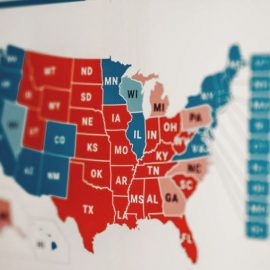

This article is an excerpt from the Shortform summary of "The Federalist Papers" by Alexander Hamilton. Shortform has the world's best summaries of books you should be reading.
Like this article? Sign up for a free trial here .
How does does the federal revenue collection power impact the state tax burden? What does Federalist Paper 36 say about the state tax burden?
State tax burden is a term that captures the amount of the nation’s taxes collected that are shouldered by a state. It can also refer to the tax burden of an individual residing in a given state.
Read more about the state tax burden and Federalist Paper 36.
Federalist Paper 36: Revenue Collection
The Articles gave the federal government some formal powers over the states, but no effective means of compelling them to action. This rendered the federal government effectively toothless.
Revenue collection presented an especially glaring enforcement problem. Federalist Paper 36 discusses the revenue collection system. The system established revenue quotas that established the state tax burden for each state. It was the amount each was required to send to the federal government. But, given the lack of an agreed-upon standard for assessing and apportioning what each state owed and the inability of the federal government to enforce its quotas, the states frequently evaded their fiscal responsibilities. They often cited the arbitrary and unequal distribution of the state tax burden as a pretext for withholding what they owed.
This had disastrous consequences during an episode known as Shays’ Rebellion, which rocked the state of Massachusetts in 1786-87. Economically discontented farmers in the western part of the state staged a violent action against the government, even seizing and burning down a state armory. But because of its inadequate revenue system, the federal government was unable to pay troops to put down the rebellion. Instead, the state of Massachusetts had to hire a private force to quell it.
The rebellion showed that the glaring defects of the Articles of Confederation could have disastrous real-world consequences.
Equal State Tax Burdens
The Constitution further guarded against the possibilities of the tax burden falling unequally on the various states by mandating that all imposts be uniform across the Union—in other words, there couldn’t be a higher federal tax for imports coming into Virginia than for those coming into New York.
Moreover, any direct taxes levied by Congress (in the 18th century these taxes would have applied chiefly to real estate) were required by the Constitution to be proportional. As per Article 1, Section 2, the tax burden assessed in each state was to be tied to that state’s population according to the decennial census.
(Shortform note: The requirement that direct taxes be levied proportionally according to the census was effectively nullified by the passage of the Sixteenth Amendment in 1913, which allowed the federal government to levy an income tax without regard to apportionment among the states.)
While there was a possibility of double taxation, Publius thought this was unlikely to pose a major burden. With an adequate revenue stream, the federal government would have little political desire to provoke resistance by taxing articles of consumption already being taxed by the states.
The states, for their part, would have few expenses to meet once their debts from the Revolutionary War were discharged. After that point, a small land tax would likely be wholly sufficient to meet their limited financial obligations.
Better Revenue Collection
A strong Union would also provide better and more efficient means of revenue collection than would a series of independent or semi-independent states. Given the difficulty and cost of assessing and collecting direct taxes (like income taxes) in the 18th century, most states raised revenue from indirect taxes, mainly in the form of duties on imported goods.
But if each of the 13 states were independent, they would each be levying their own customs duties. Each state tax burden would stack up and become overly burdensome for merchants and would give a strong incentive for evasion. Moreover, the sheer size of the land borders between states, the existence of a common language, and the availability of navigable rivers would make it far too easy for merchants to evade state customs duties. Therefore, even if each state spent extraordinary (and duplicative) resources to crack down on this contraband trade, they would still only apprehend a small number of illegal traders and remain perpetually short of crucial revenue.

———End of Preview———
Like what you just read? Read the rest of the world's best summary of Alexander Hamilton's "The Federalist Papers" at Shortform .
Here's what you'll find in our full The Federalist Papers summary :
- The genius of the founding fathers in how they designed the United States Constitution
- Why it was critical for the United States to form a union rather than stay separated as colonies
- How Alexander Hamilton anticipated social issues that are still relevant today






